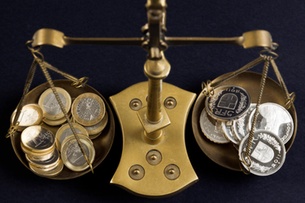The SNB conducts a difficult balancing act to stabilise the national economy. (Keystone) - Click to enlarge As the Swiss franc weakens towards the threshold CHF1.20 exchange rate, the likelihood remains slim that Switzerland’s central bank will alter monetary policy any time soon. On Thursday morning a euro cost CHF1.198 francs. In February, the price of a single euro fell to under CHF1.150. The greater the number of francs needed to buy another currency signals a weaker franc, and vice versa if the exchange rate declines. The markets are now eyeing the magic CHF1.20 barrier which was the minimum rate defended by Swiss National Bankexternal link (SNB) until it abandoned its policy in January 2015. The Swiss
Topics:
Swissinfo considers the following as important: 1) SNB and CHF, Business, European Central Bank, Featured, newslettersent, Swiss National Bank
This could be interesting, too:
Nachrichten Ticker - www.finanzen.ch writes Die Performance der Kryptowährungen in KW 9: Das hat sich bei Bitcoin, Ether & Co. getan
Nachrichten Ticker - www.finanzen.ch writes Wer verbirgt sich hinter der Ethereum-Technologie?
Marc Chandler writes March 2025 Monthly
Mark Thornton writes Is Amazon a Union-Busting Leviathan?

The SNB conducts a difficult balancing act to stabilise the national economy. (Keystone) - Click to enlarge
As the Swiss franc weakens towards the threshold CHF1.20 exchange rate, the likelihood remains slim that Switzerland’s central bank will alter monetary policy any time soon.
On Thursday morning a euro cost CHF1.198 francs. In February, the price of a single euro fell to under CHF1.150. The greater the number of francs needed to buy another currency signals a weaker franc, and vice versa if the exchange rate declines.
The markets are now eyeing the magic CHF1.20 barrier which was the minimum rate defended by Swiss National Bankexternal link (SNB) until it abandoned its policy in January 2015. The Swiss export and the domestic tourism industries want the franc to weaken to allow goods to be sold more competitively abroad and give visitors more spending power when they come to the country.
The SNB pumped hundreds of millions of francs into defending its CHF1.20 exchange rate by buying foreign currency denominated assets. The central bank also reduced interest rates to a negative target rate of -0.75%, reducing the franc’s attractiveness as a safe haven currency for foreign investors.
Volatile markets
This second policy came with negative side-effects, such as inflating property prices and reducing the return on some traditional financial investments. The SNB therefore has a motive to normalise interest rates, but this has a down side – it could strengthen the franc once again.
But after its monetary policy meeting in March the SNB said market conditions remain too volatile to contemplate an interest rate rise.
“The Swiss franc remains highly valued. The situation in the foreign exchange market is still fragile and monetary conditions may change rapidly,” the SNB stated. “The negative interest rate and the SNB’s willingness to intervene in the foreign exchange market as necessary therefore remain essential.”
Analysts, such as the KOF Swiss economic instituteexternal link which published its latest forecast on March 28, do not expect Swiss interest rates to rise this year. This is partly because instability created by national elections, such as Italy, and trade disputes between the United States and various countries could see a flight of capital to the franc at any moment.
Another reason is that the European Central Bank (ECB) continues to print large volumes of euros to buy bonds from economically weaker member states. While the ECB’s quantitative easing programme has been reduced this year, experts think the SNB will wait for it to end completely before thinking of an interest rate rise.
Tags: Business,European central bank,Featured,newslettersent,Swiss National Bank
